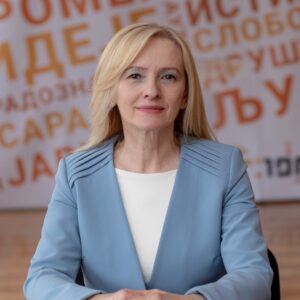Fields of research
Political parties; Democratic transition; Ethnic relations, nationalism
Current research projects
Parliamentarism; Women and politics (gender inclusive policies)
Biography
The year of receiving the highest degree of professional qualification Ph.D. 2009.
DrDijanaVukomanovićgraduatedfromtheFacultyofPoliticalSciences,UniversityofBelgradein1989,receivedherMaster’sdegreefromtheCentralEuropeanUniversityinBudapestin1995,andherPhDfrom the FacultyofPoliticalSciences,UniversityofBelgradein2009.
Dr.Vukomanović’sprofessionalcareerisfocusedonscientificresearch-withintheInstituteofSocialSciencesinBelgrade(intheperiodfrom1992to2000,andfrom2020to the present),aswellasat the InstituteforPoliticalStudiesinBelgrade(from2000to2012).
She has published about forty scientific research papers in domestic and foreign scientific publications, in Serbian and English, dedicated to political parties, democratic transition, nationalism, ethnic conflicts, political culture, civic participation, parliamentarism, etc. She has been engaged in numerous scientific research projects and empirical public opinion research within scientific research organizations.
Inparallelwith her scientificresearch,Dr.Vukomanovićwasalsoactiveintheworkofdomesticandforeigncivilsocietyorganizations(ForumforEthnicRelations,EuropeanMovementinSerbia,Oxfam,CenterforDemocraticCulture,etc.)onprojectsdedicated to thedevelopmentofdemocracy,multiculturalism,localself-government,sustainabledevelopment,etc.
In the period 2012-2020, she was a member of the National Assembly of the Republic of Serbia. She was the Chairperson of the Standing Delegation of the National Assembly of the Republic of Serbia to the OSCE Parliamentary Assembly, and a member of various parliamentary committees: the Committee on European Integration, the Foreign Policy Committee, the Committee on Education and Science, the Committee on the Diaspora, etc. She was an active member of the Women’s Parliamentary Network, and participated in peacemaking projects and dialogues of prominent women from the Western Balkan countries.
Member of the research team of the Forum for Ethnic Relations (Belgrade), 1994-1998; Member of the Academic Cooperation Network in South East Europe, which brings together partner scientific institutions and scientists from the region on the implementation of projects of democratization and multiculturalism (since 2021); Member of the Study аnd Research Group for Gender Equality and Public Policies, Institute of Social Sciences (since 2020).
Membership of professional organisations
-Memberof the Presidencyof the YugoslavPoliticalScience Association (Belgrade),1998-2000.
Scholarships, fellowships, grants
Study visit in the UK, Chevening Scholarship, at the University of London (School of Slavic and East-European Studies), 1997; Study visit in the United States (within the USIA program “Congressional Campaign and Governance”), 1998
Work in education
Guest lecturer at educational seminars and summer schools for the student population organized by educational institutions, non-governmental and international organizations (Open University of Subotica, Belgrade Open School, OSCE, etc.).
Major publications
Vukomanović, D. (2022). Hybrid Election Management Methods During the Covid-19 Crisis. Serbian Political Thought, 78 (4), 25-41.
Vukomanović, D. P. (2021). Gender Sensitivity of the Serbian Parliament – mapping the power of women MPs. Sociološki pregled, 55 (3), 624–649.
Vukomanović, D. (2021). Development of migration management portfolio in Western Balkans region. Forum za sigurnosne studije, 4/5 (4/5), 97–123.
Vukomanović, D. (2021). Institucionalna efikasnost parlamenta Srbije (2008-2020). Politička revija, 68 (2), 105–127.
Vukomanović, D. (2020) New modes of acculturation and democratic institutional change during COVID-19 crisis. In: Political and economic self-constitution: Media, political culture and democracy: Proceedings of the 8th international scientific and practical seminar. Belgrade: Institute of Social Sciences, Kyiv: Center for Personal and Social Transformations, pp. 24–28.

